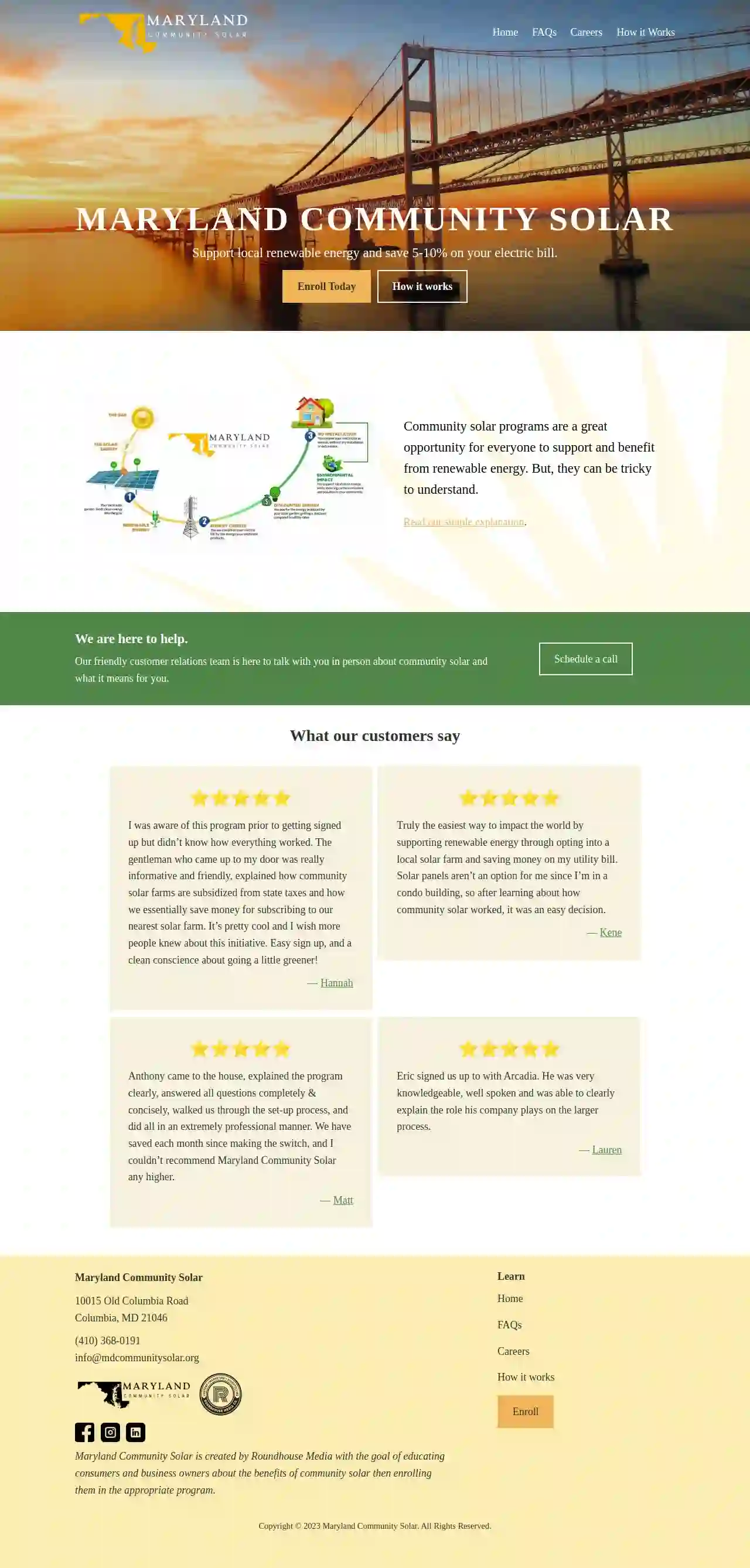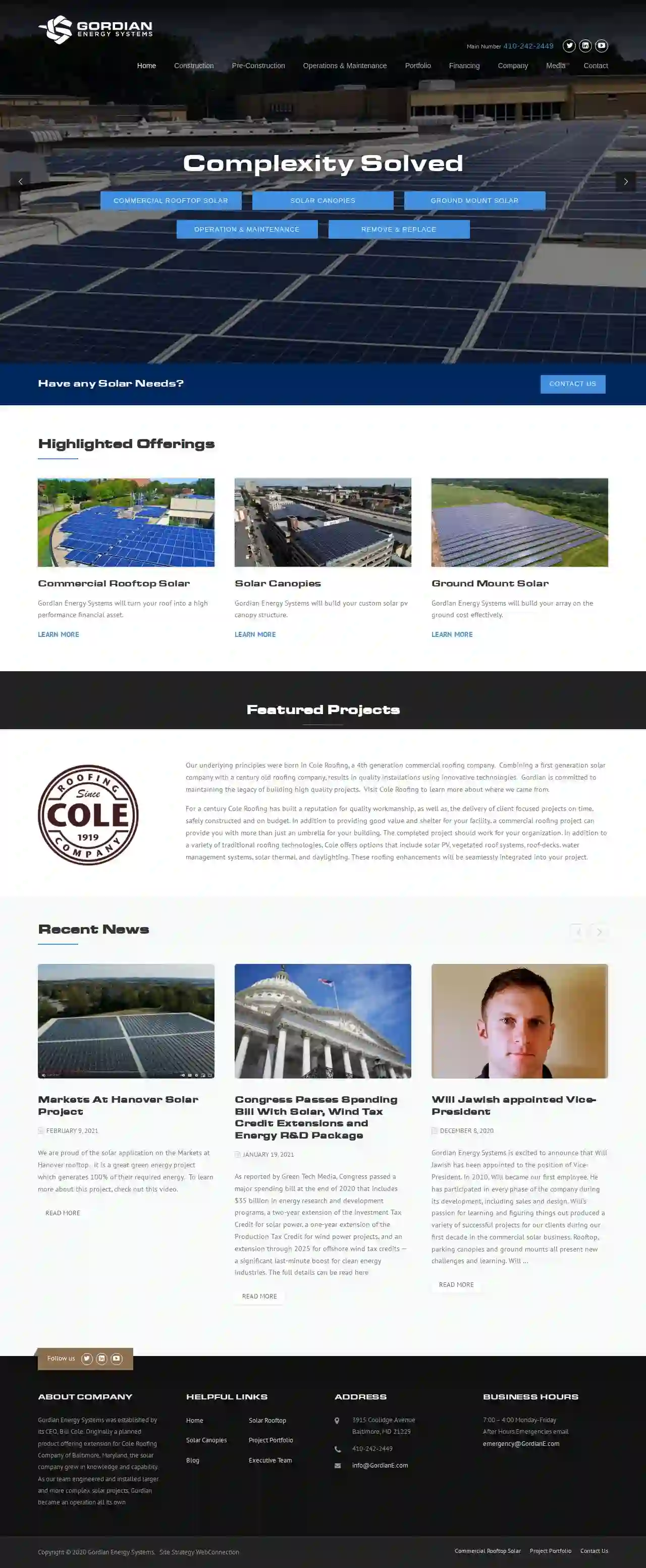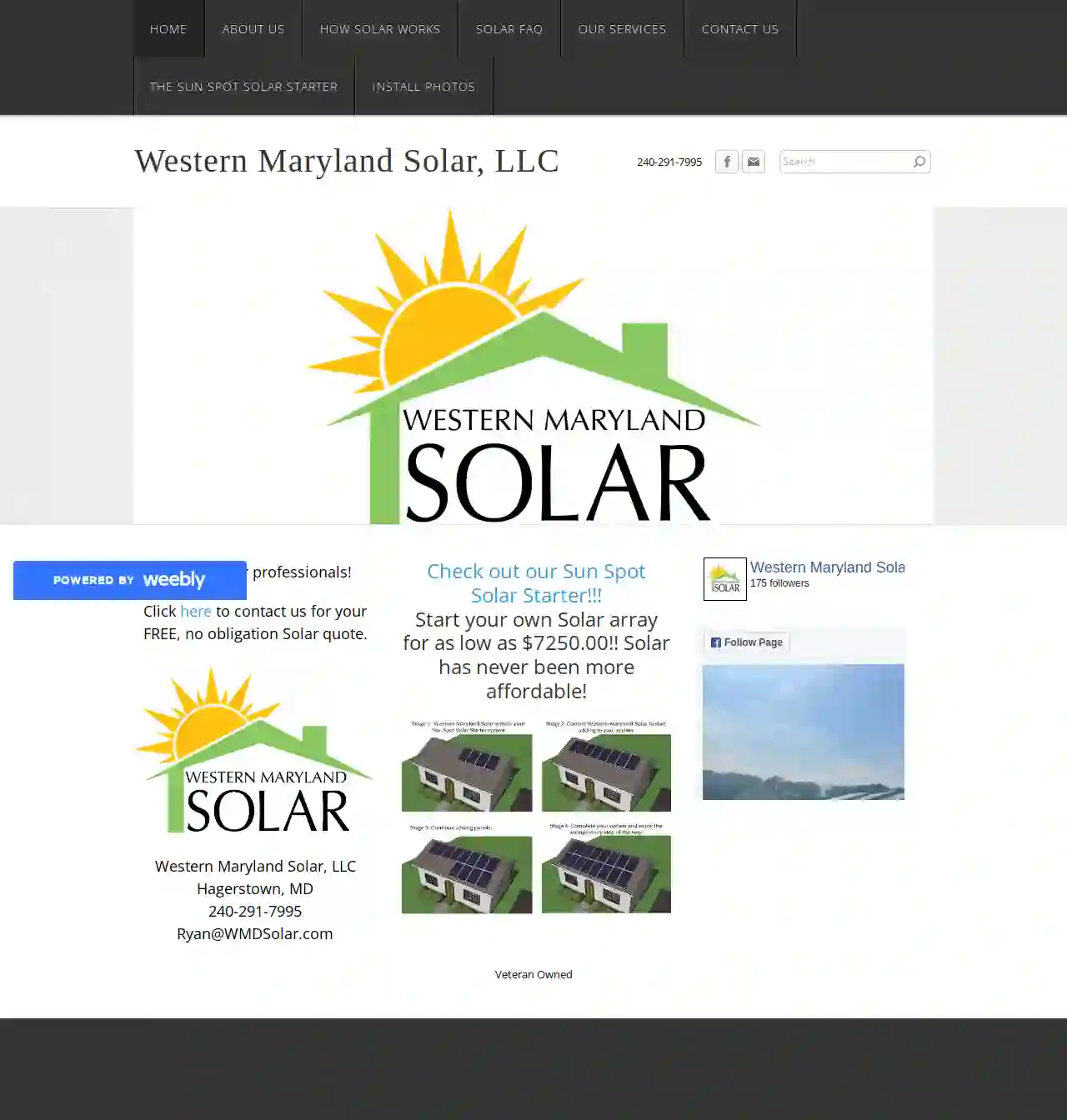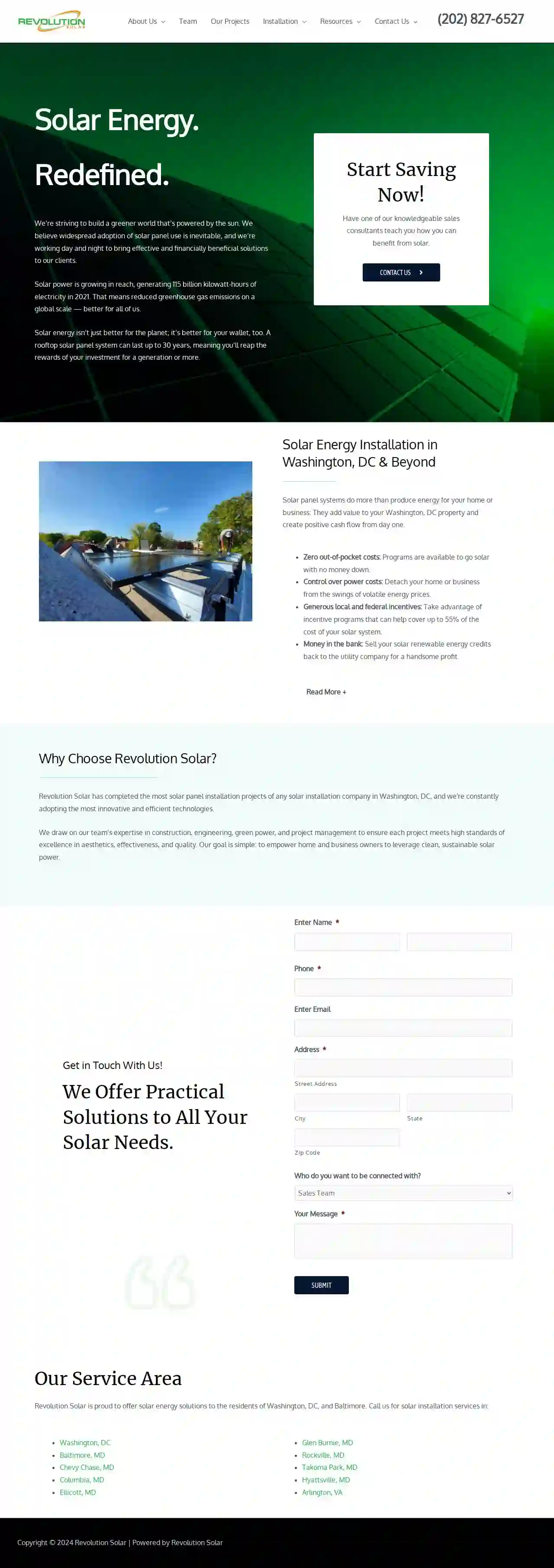Solar Installers Glenn Dale
Find the best Solar Installation Company in Glenn Dale
Receive 3 FREE Solar Energy Companies quotes for your project today! Compare profiles, reviews, accreditations, portfolio, etc... and choose the best service.

Maryland Community Solar
4.911 reviews10015 Old Columbia Road, Columbia, MD 21046, 21046, USMaryland Community Solar is a program that allows consumers and business owners to support local renewable energy and save 5-10% on their electric bill. The program is created by Roundhouse Media with the goal of educating and enrolling individuals in the appropriate community solar program.
- Services
- Why Us?
- Accreditations
- Our Team
- Testimonials
- Gallery
Get Quote
Ultra Solar Group
510 146th Street, Suite 6, Ocean City, 21842, USThe Ultra Solar Group is a leading provider of solar energy solutions, offering a range of services including project development, engineering, procurement, and construction, as well as operation and maintenance. They are a SunPower dealer, providing high-quality solar panels and solutions for residential and commercial clients. Their team is certified and trained through SunPower and NABCEP workshops, ensuring top-notch installation and maintenance services.
- Services
- Why Us?
- Accreditations
- Gallery
Get Quote
Truly Solar Inc
52 reviews9701 Apollo Drive, Largo, Maryland, 20774, USTruly Solar Inc. specializes in providing eco-friendly energy solutions through solar systems. They offer a variety of services including solar system repair, solar farm services, roof top solar panels, vehicle charging stations, ground mount solar installation, off-grid battery backup, and solar patio covers. Their mission is to assist homeowners and businesses in choosing the optimal method to power their lives, enhance their community, and preserve the environment.
- Services
- Why Us?
- Accreditations
- Our Team
- Testimonials
- Gallery
Get Quote
Standard Solar Inc.
48 reviewsBeverly Hills, CA, 123 Solar Way, 90210, USStandardsolar is a leading provider of solar energy solutions, offering a range of services including solar panel installation, maintenance, and repair. With a focus on sustainability and renewable energy, Standardsolar aims to help individuals and businesses reduce their carbon footprint and save on energy costs. Their team of experienced professionals ensures high-quality service and customer satisfaction.
- Services
- Why Us?
- Accreditations
- Our Team
- Testimonials
- Gallery
Get Quote
Gordian Energy Systems
54 reviewsBaltimore, MD, 3915 Coolidge Avenue, 21229, USGordian Energy Systems is a leading provider of commercial solar solutions, offering a range of services including construction, solar engineering, procurement, and operations and maintenance. With a focus on delivering high-quality projects on time, safely constructed, and on budget, Gordian Energy Systems has built a reputation for excellence in the industry. The company's underlying principles were born in Cole Roofing, a 4th generation commercial roofing company, combining a first-generation solar company with a century-old roofing company to deliver innovative technologies and quality installations.
- Services
- Why Us?
- Accreditations
- Our Team
- Testimonials
- Gallery
Get Quote
Western Maryland Solar
52 reviewsHagerstown, MD, 21740, USWestern Maryland Solar, LLC is a veteran owned small business. We are a client focused installer of photovoltaic systems. We are Solar professionals. Choose Western Maryland Solar for all of your Solar needs!
- Services
- Why Us?
- Accreditations
- Our Team
- Gallery
Get Quote
Skywave Solar
510 reviews101 Skipjack Road, Prince Frederick, 20678, USSkywave Solar is a locally owned and operated company located in Southern Maryland with years of industry experience working with PV solar system owners, roofing companies, and asset management companies. They are committed to delivering unrivaled optimized PV solar system maintenance and service. Their mission is to protect and maintain solar panel system investments through excellence in maintenance service and an unparalleled customer experience.
- Services
- Why Us?
- Accreditations
- Gallery
Get Quote
Revolution Solar
526 reviewsRevolution Solar, Washington, DC, 123 Solar Street, 20001, USRevolution Solar is a leading provider of solar energy solutions in Washington, DC, and Baltimore. They offer a range of services including solar panel installation, solar panel replacement, rooftop solar systems, solar ground mounts, solar rooftop decks, solar pergolas, solar batteries, and commercial solar services. Their mission is to empower home and business owners to leverage clean, sustainable solar power. They have completed the most solar panel installation projects in Washington, DC, and constantly adopt innovative and efficient technologies.
- Services
- Why Us?
- Accreditations
- Our Team
- Testimonials
- Gallery
Get Quote
American Solar Repair
Solar City, Solar District, 123 Solar Street, New York, 10001, USAmerican Solar Repair is a nationwide solar repair and maintenance service provider. Their mission is to serve residential solar owners nationwide, offering a full array of solar services including solar removal & reinstall, solar repair, solar maintenance, solar inspection, solar cleaning, and critter guard install & pest control. They are certified to meet the most complex standards of solar service help and are committed to consistently delivering the highest-quality, long lasting workmanship for your solar panels.
- Services
- Why Us?
- Accreditations
- Our Team
- Testimonials
- Gallery
Get Quote
General Solar Company
4.9129 reviews123 Main St, Suite 100, Rockville, 20850, USGeneral Solar Company has been providing professional window film and glass coating installations for residential and commercial properties since 1969. Our success over the past 50 years is directly tied to our expertise. All of our professional installers have been with us for over 20 years and our salesperson has been with us for over 30 years. At General Solar Company, our expert team has the experience to help you identify the best window film product for your unique needs and budget.
- Services
- Why Us?
- Accreditations
- Our Team
- Testimonials
- Gallery
Get Quote
Over 4,210+ Solar Contractors onboarded
Our solar experts operate in Glenn Dale & surroundings!
SolarCompaniesHub has curated and vetted the Best Solar Contractors near Glenn Dale. Find a top & reliable contractor today.
Frequently Asked Questions About Solar Installers
- System size (measured in kilowatts, or kW)
- Type of solar panels (monocrystalline, polycrystalline, thin-film)
- Roof complexity (pitch, size, obstructions)
- Labor costs in your area
- Available incentives and rebates
- String Inverters: Connect multiple panels in a series (a 'string'). A cost-effective option for simple systems, but a single panel issue can affect the entire string.
- Microinverters: Attach to each individual solar panel, maximizing energy production even if some panels are shaded. They are more expensive but offer greater efficiency and monitoring capabilities.
- Power Optimizers: Similar to microinverters, but less expensive. They optimize the output of each panel and provide individual panel monitoring, but a central inverter is still required.
- Hybrid Inverters: Combine a solar inverter with a battery charge controller, allowing for seamless integration of battery storage.
- Analyze your energy bills
- Assess your roof's suitability
- Calculate your potential solar energy generation
- Recommend a system size that meets your needs and goals.
What is the average cost of solar panel installation in USA?
What are the different types of solar inverters?
Do I need to replace my roof before installing solar panels?
How do I choose the right solar panel system size for my needs?
What is the average cost of solar panel installation in USA?
- System size (measured in kilowatts, or kW)
- Type of solar panels (monocrystalline, polycrystalline, thin-film)
- Roof complexity (pitch, size, obstructions)
- Labor costs in your area
- Available incentives and rebates
What are the different types of solar inverters?
- String Inverters: Connect multiple panels in a series (a 'string'). A cost-effective option for simple systems, but a single panel issue can affect the entire string.
- Microinverters: Attach to each individual solar panel, maximizing energy production even if some panels are shaded. They are more expensive but offer greater efficiency and monitoring capabilities.
- Power Optimizers: Similar to microinverters, but less expensive. They optimize the output of each panel and provide individual panel monitoring, but a central inverter is still required.
- Hybrid Inverters: Combine a solar inverter with a battery charge controller, allowing for seamless integration of battery storage.
Do I need to replace my roof before installing solar panels?
How do I choose the right solar panel system size for my needs?
- Analyze your energy bills
- Assess your roof's suitability
- Calculate your potential solar energy generation
- Recommend a system size that meets your needs and goals.